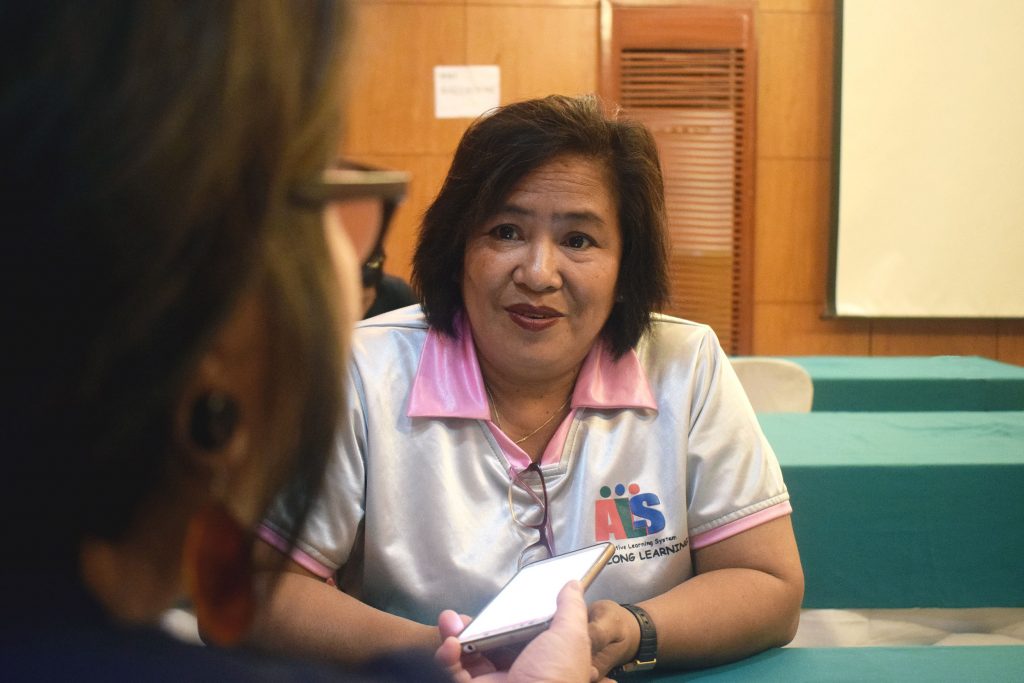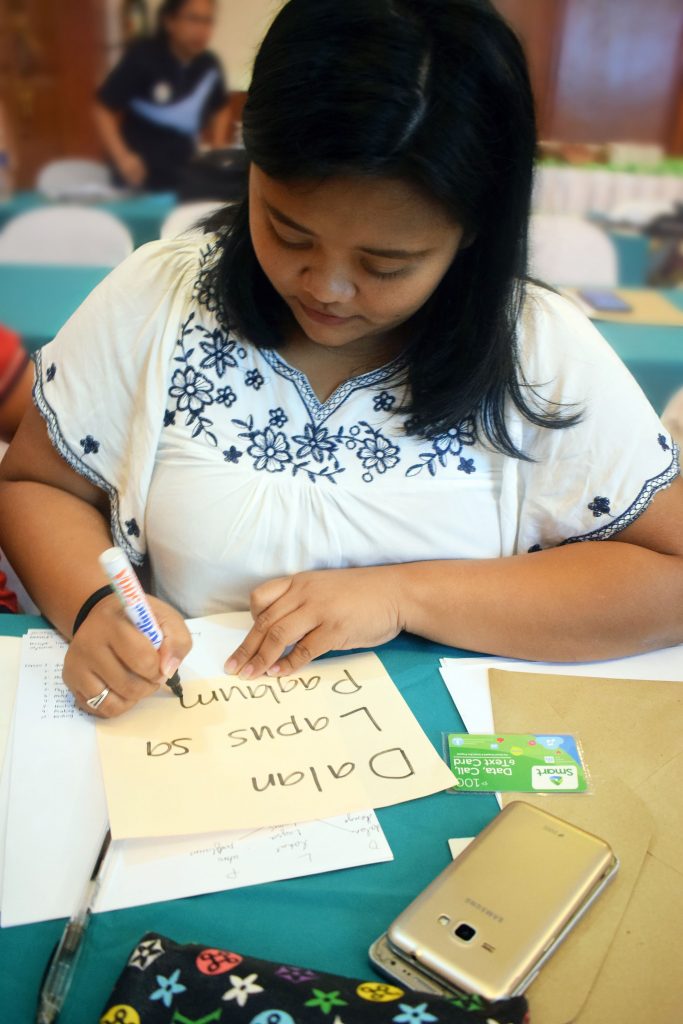Baliguian Island, the farthest paradise off the coast of Concepcion in Iloilo, boasts of a pristine beach with clear waters. The island is home to fisherfolk who dream of having a good education and a better life for themselves and their children.
However, because the island is hard to reach, the eager learners have no access to formal education. That is why Alternative Learning System (ALS) facilitator Ma. Lourdes Obillos braves the winds and waves for three hours onboard a small boat from Concepcion to reach Baliguian, then treks to get to the community center to conduct informal classes.

Traveling to the island is just part of the challenge though, as the ALS set-up is never easy. Unlike in formal education, the ALS teacher is the one who goes to the community where the learners are to hold weekly multigrade classes — a single class where students are of different ages and competencies. Obillos’ ALS class is composed of three groups of students — basic education for those who are unable to read and write, elementary, and secondary — with all of them needing her attention at the same time.
Improving lives through education
A program of the Department of Education (DepEd), ALS is non-formal education that provides a learning path for learners to have a second chance of finishing either primary or secondary education. Classes are conducted once or twice a week in either schools, community centers, or anywhere the learners and ALS teacher can find a space to gather and do their work.

Despite the hardships that they experience while traveling by sea or trekking the mountains and managing three groups of students in one class, Obillos said they persevere because they know the extent of help the community needs. “Parents would confide to us that they have nothing to offer to their children in terms of education because they themselves did not have the opportunity to go to school,” the educator emotionally shared.
“In spite of all the hurdles, I truly believe that education will improve their lives, so that motivates us to keep doing what we do,” she explained.
Learning independently
When Obillos was informed by the local government unit (LGU) of Concepcion that she will be attending a workshop on the Central Visayas Institute Foundation – Dynamic Learning Program (CVIF-DLP), she immediately Googled the program. Developed by Ramon Magsaysay laureates and world-renowned Theoretical Physicists, Dr. Christopher Bernido and Dr. Ma. Victoria Carpio-Bernido, CVIF-DLP promotes independent learning in students to improve academic performance particularly in Science, Technology, Engineering, Arts, and Mathematics (STEM).
First implemented in the Central Visayan Institute Foundation (CVIF) in Jagna, Bohol, CVIF-DLP is as a disaster-resilient form of education that can be implemented on a shoestring budget. It uses parallel learning groups, activity-based multi-domain learning, in-school comprehensive student portfolio, and strategic study and rest periods to improve student academic performance as well as support teachers’ needs.
“I recognized the positive impact that the training will have on our ALS facilitators and students and realized that this will address the problems in remote communities where young and adult learners are deprived of education,” Obillos detailed.
Addressing ALS challenges
A CVIF-DLP workshop was recently held at the Iloilo Business Hotel for ALS facilitators from the towns of Concepcion, Cabatuan, Lambunao, Leon and Mina. The participants learned how create and make use of Learning Activity Sheets (LAS) designed for each level — basic, elementary, and secondary — to help them manage their multigrade classes better and enable their learners to work on activities independently.
Workshop attendees saw how the method is suited for ALS. “One major challenge faced by instructors is poor attendance from ALS learners, who are mostly breadwinners who still need to work,” said Dane Jeselle Cadaydayon, ALS facilitator from Leon Elementary School.
“Through this strategy, students can bring the learning activity sheets home and catch up with the help of their ALS teachers,” she pointed out.
“If I were an ALS learner, the CVIF-DLP will definitely help me pass the A&E,” Cadaydayon added, referring to the DepEd’s Accreditation & Equivalency Test for ALS. The competency exam is required for ALS students who wish to enroll in secondary and post-secondary schools.
Dr. Ray Butch Mahinay, DepEd’s Focal Person for ALS in Region 10, said that the CVIF-DLP methodology has a huge impact on mobile ALS teachers. “CVIF-DLP gives ALS students more flexibility considering that most of them are working or have limitations – some are confined in jail, or are single parents balancing informal school with work and raising their children, or are located in far-flung areas with no electricity,” he listed.
“CVIF-DLP can definitely empower ALS learners, with results evident even after only a quarter grading period,” said Cherry Quillopas, workshop facilitator and DLP Ambassador from La Salette, Dagupan City.
Engaging the community
There is an African proverb that says “it takes a village to raise a child” and that “village” includes not just the parents and teachers in school, but even the Local Government Unit (LGU) and the private sector.
The training of ALS implementors formed part of the incentive provided by PLDT and Smart Communications (Smart) to Iloilo LGUs of Concepcion, Cabatuan, Lambunao, Leon and Mina, who were conferred with the Seal of Good Education Governance by Synergeia Foundation with the support of USAID Philippines. The Seal is in recognition of the work of LGUs in championing the cause of education in their provinces, cities, and municipalities.
On top of the CVIF-DLP training, PLDT and Smart and PayMaya Philippines provided each LGU with two Smart School-in-a-Bag packages. The School-in-a-Bag is a portable digital laboratory that provides public schools, even in remote areas without electricity, with access to digital technologies and interactive educational content.
Housed in a backpack, the contents include a solar panel and battery charging unit, an LED TV, a laptop, tablet and a Smart LTE pocket WiFi for the teacher, tablets for the students, and learning apps in the mother tongue.
Providing access to innovative technologies
The CVIF-DLP Training, School-In-A-Bag, and the suite of mobile literacy apps in the mother tongue are among the initiatives of Smart under its education advocacy, #LearnSmart. “We remain committed to helping provide access to education by promoting innovative 21st century pedagogies, developing and making available community-developed learning apps, and providing access to digital technologies,” said Stephanie Orlino, Head of Education Programs at Smart Public Affairs.
For more information on different #LearnSmart programs, visit www.facebook.com/SmartCommunities or send an email to[email protected].